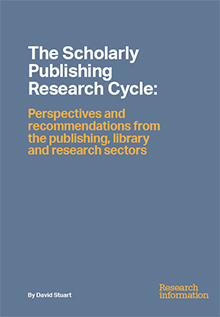Strength through collaboration
London’s Business Design Centre was the venue for Research Information’s inaugural event, Challenges in the Scholarly Publishing Cycle

Organised by Research Information magazine, in partnership with London Info International (LII), this one-day event addressed some of the most important issues in scholarly communications from the perspective of the three main stakeholder groups – publishers, academics and information professionals.
Building on a specially commissioned piece of research, the day provided representatives from each of the three sectors with an understanding of the problems and challenges faced by the other stakeholder groups, and gave an opportunity to strengthen working practices and partnerships.
There were six main presentations throughout the day – two from publishers, two from researchers and two from information professionals – followed by a group discussion of the Research Information report The Scholarly Publishing Research Cycle: Perspectives and recommendations from the publishing, library and research sectors.
The Publishers
Carolyn Kirby, from Taylor & Francis, described how libraries are playing an integral role in the publication process; supporting researchers, managing funding and conducting research output reporting and assessment exercises.
Taylor & Francis partnered with several libraries in the UK and Germany to pilot a manual reporting system which gives libraries exactly that – visibility of all affiliated research upon acceptance. This has now been developed into an online application which offers the library article metadata within 24 hours of acceptance. Author communications, as a part of the dashboard, are next in the pipeline of developments.
Kirby’s presentation gave an overview of the challenges faced by a global publisher to implement an affiliation-based workflow and meet the evolving needs of the scholarly communications community.
Pensoft Publishers’ Iliyana Kuzmova described the company’s data publishing module ARPHA, which was developed for biodiversity publishing.
Being historically a publisher in this sphere, Pensoft has worked a lot with its authors and with some leading initiatives to be able to provide a rather unique level of integration with various data repositories, not only in terms of archiving, but also in terms of applying automated workflows that allow direct import of data into a structured article format.
The more advanced XML workflow of the platform was specifically developed to create the Biodiversity Data Journal (BDJ) and answer the needs of the most advanced minds in the biodiversity community. All articles in BDJ are both human and machine readable, content is discoverable and exportable.
The information professionals
Jessica Clemons, of the University at Buffalo, and Roger Schonfeld, of Ithaka S+R, focused on access and publishing efforts at the University at Buffalo, across the State University of New York at the local and system level, and broadly across higher education in the United States.
The pair noted that librarians are looking for approaches that serve their researchers effectively, steward their resources appropriately and respond to the changing environment strategically. Many libraries have been investing in pre-prints by support for institutional or disciplinary repositories.
They reported that librarians have begun to meaningfully engage with researchers around issues like open access monograph publishing initiatives, where access for one is access for all. In another growing approach, libraries are breaking up the big deal and integrating document delivery services in place of subscriptions. Librarians are finding sophisticated ways to engage with publishers – not only at the negotiating table but in their broader relationship.
Bernie Folan, of Bernie Folan Consulting, reflected on the results of a survey carried out earlier in the year, which encouraged librarians to send ‘messages’ to the wider publishing community. In a joint presentation with Jane Johnson, of Dawson Books, and Paul Tavner of Hindawi, Folan highlighted how the most important issues for libraries are based around pricing models and user experience – while Johnson and Tavner explained how their respective firms aim to respond to the results of the survey.
The researchers
Anthony Watkinson, of Ciber Research, referred to work carried out for the Publishing Research Consortium over the last three years, asking the question: are early career researchers the harbingers of change?
Watkinson explained that young researchers often feel that their career development is dependent on their work being published in high-impact journals, despite their overriding beliefs in the concepts of transparency, sharing and openness. While they are generally an optimistic group, they feel somewhat constrained by the scholarly communications systems as it stands.
The last presentation was by Helen Blanchett, of Jisc, with Andy Turner of the University of Leeds. Blanchett touched on the keenness of researchers to be involved in open science, the associated roles of research managers and developers in achieving this – and the need for the wider publishing industry to engage with researchers. Turner rounded off the day with an entertaining recollection of some of the highlights (and lowlights) of his career as a researcher.
The author of the report, David Stuart, is an independent information professional, a former research fellow at King’s College London and an honorary research fellow at the University of Wolverhampton
A broken system?
The scholarly publishing cycle is widely felt to be broken – with researchers feeling abused, publishers unappreciated and librarians powerless.
These were the conclusions of The Scholarly Publishing Research Cycle: Perspectives and recommendations from the publishing, library and research sectors, which was launched by Europa Science, the parent company of Research Information, at the December event. The report is now available to purchase here*.
The report analyses responses and data gathered by a survey of 200 publishers, librarians and academic researchers, augmented by 12 in-depth interviews with leading names in all three sectors.
Its author asked respondents to identify the most important challenges in their sector – and, crucially, what they felt were the major challenges for the other two sectors.

Questions were asked around the 14 major issues identified in current research literature, such as accessibility and open access. But respondents also raised six challenges not yet covered by the literature, including timeliness of publishing, the impact of ‘publish or perish’ policies, and the crisis in research funding.
The report delivers: invaluable insights into what your peers see as the most pressing challenges in your sector; better understanding of the sentiments, concerns and priorities of your partners in the other cycle sector; practical recommendations for how publishers, researchers and librarians can improve the way they work with other stakeholders; and data that can underpin new business cases for beneficial changes in strategy.
Interviewees include:
- Dr Danny Kingsley, Scholarly Communication and Research Services, Cambridge University Library;
- Professor Lisa Janicke Hinchliffe, Professor/Coordinator for Information Literacy Services and Instruction, University Library, University of Illinois at Urbana-Champaign;
- Simon Bains, Head of Research Services and Deputy Librarian, The University of Manchester Library;
- Elaine L Westbrooks, Vice Provost of University Libraries and University Librarian, University of North Carolina at Chapel Hill;
- Clare Hooper, Head of Journals, Liverpool University Press;
- Jean Roberts, Business Development Director UK/Europe, Glasstree Academic Publishing;
- Gemma Hersh, Vice President Open Science, Elsevier;
- Sara Uhac, Managing Director, InTech;
- Professor Stephen Curry, Professor of Structural Biology, Imperial College London;
- Dr Corina Logan, Leverhulme Early Career Research Fellow, University of Cambridge, and co-lead on the Bullied into Bad Science campaign;
- Professor Charles Oppenheim, Former Head of Department of Information Science, Loughborough University; and
- Professor Martin Eve, Professor of Literature, Technology and Publishing, Birkbeck, University of London.
*Academics/librarians with a valid academic email address can access an online version of the report without charge here. You must be registered with Research Information, have completed your demographic questions, and be logged in to view. To register, click here.






